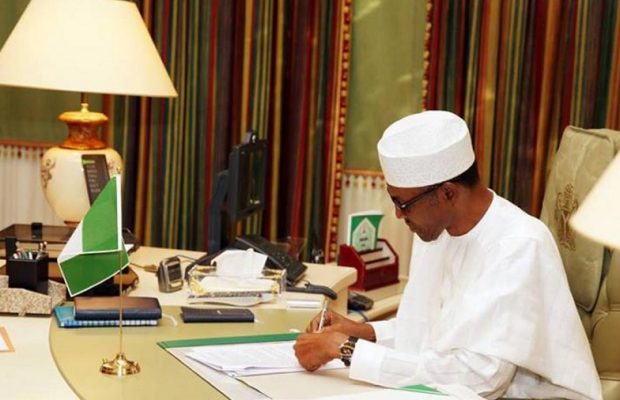President Muhammadu Buhari has on Thursday approved the appointment of a 30-member tripartite National Minimum Wage Committee for the negotiation of a new salary scheme for workers in the country.
This move comes as a relief to workers who have waited for over a year for discussions to kick off on the call by Labour for a new minimum wage of N56,000.
Afripost recalls that the organised labour, comprising the Nigeria Labour Congress and Trade Union Congress (TUC), had during the 2016 May Day demanded a N56, 000 upward review of the nation’s minimum wage from the current figure of N18,000.
By its tripartite nature, the committee is made up of persons from the public sector (federal and state governments) and the private sector made up of the largest private employer group, the Nigeria Employers Consultative Association (NECA), Manufacturers Association of Nigeria (MAN), Nigerian Association of Chambers of Commerce Industry, Mines and Agriculture (NACCIMA) and Nigerian Association of Small and Medium Enterprises (NASME)
According to a statement signed by the deputy director (Press) at the Ministry of Labour and Employment, Samuel Olowokere, former head of service of the federation, Ama Pepple, is to chair the Tripartite National Minimum Wage Committee
The federal government team will be led by the minister of labour and employment, Dr Chris Ngige, who is deputy chairman, while the chairman, National Salaries, Income and Wages Commission,Chief Richard Egbule, will serve as secretary. Others in the the federal government team are the minister, Budget and Planning, Udo Udo Udoma; minister of Finance, Kemi Adeosun; head of the Civil Service of the Federation, Winifred Oyo-Ita ; permanent secretary, General Services Office, Office of the Secretary to the Government of the Federation, Dr. Roy Ugo.
A team from the Nigeria Governors’ Forum (NGF) includes Osun State governor, Rauf Aregbesola (South West), Imo State governor, Rochas Okorocha (Souh East), Gombe State governor, Hassan Dankwambo (North East), Rivers State governor, Nyesom Wike (South South), Plateau State governor, Simon Lalong (North Central), and Kebbi State governor, Abubakar Atiku Bagudu (North West), while the director-general of NGF, A. B. Okauru will be an observer.
On the trade union’s side, the president, Nigeria Labour Congress (NLC), Comrade Ayuba Wabba, leads a team that include, comrades Peters Adeyemi, Kiri Mohammed, Amechi Asugwuni, Peter Ozo-Eson .
The Trade Union Congress (TUC) team, led by its president, Comrade Bobboi Bala Kaigama , has comrades in its fold; Sunday Olusoji Salako, Alade Bashir Lawa, and Igwe Achese, the president, Nigeria Union of Petroleum and Natural Gas Workers (NUPENG)
On the employers’ side are the director-general, Nigeria Employers’ Consultative Association (NECA), Mr Olusegun Oshinowo, Mr Timothy Olawale (NECA), Mr. Chuma Nwankwo (NECA); Mr Olubunmi Adekoje, DG, Federation of Construction Industry (FOCI); Alhaji Ahmed Ladan Gobir, chairman, Kaduna East Branch, Manufacturers’ Association (MAN), Otunba Francis Oluwagbenro (MAN); Hajia Muheeba Dankaka, president, Kano Chambers of Commerce, Industry, Mines and Agriculture (NACCIMA), Prince Degun Agboade, president, Nigeria Association of Small and Medium Enterprises (NASME)
The committee is to be inaugurated on Monday at the Council Chambers, Presidential Villa, Abuja.
Former President Goodluck Jonathan had in March 2011 signed the present Minimum Wage Act into law. The law raised the national minimum wage from N7, 500 to N18, 000.
During negotiations for that upward review which began in 2009, Labour had publicly demanded N52,200 minimum wage for workers, but later settled for N18, 000 which was passed by the National Assembly and later signed into law.
Recall that the demand for upward review of workers’ wage started in 1945 when workers staged the famous 45-day general strike for a Cost of Living Allowance (COLA). Between then and 2007 when the demand by workers for a 25 per cent general wage increase through the Ernest Shonekan Wage Consolidation Committee was arbitrarily cut down to 15 per cent by President Olusegun Obasanjo, workers had struggled for 15 times to have wages improved.


